John Pilger died a year ago on Dec. 30, 2023. Better than just about anyone else, he used his prodigious talents to simply do his job as a reporter, writes Joe Lauria.
By Joe Lauria
Special to Consortium News
During a lifetime of extraordinary journalism on both paper and the screen, John Pilger, who died one year ago on Monday, showed the world the suffering caused by U.S.-led aggression in mostly poor nations, which had the temerity to hinder Washington’s path to global dominance.
In his many extraordinary films, books and articles, Pilger filled in what corporate media purposely left out: the industrial-scale human casualties of governments that dare call themselves democracies.
Pilger was simply doing his job as a reporter. What made him stand out exceptionally were herds of journalists not doing theirs.
And what is their job? To reveal the depravations of the powerful that result in the deprivations of the weak. If there was an essence to Pilger’s work it was this: he connected Whitehall, White House and Wall Street decisions to the wasting of innocent lives a world away.
This is searingly portrayed in a scene from his film Year Zero: The Silent Death of Cambodia (1979) about the aftermath of the Khmer Rouge’s genocide. Pilger says:
“These children are the end of a process begun by impeccable politicians who took their decisions at great distance from the results of their savagery. Their style may have been different from Pol Pot, but the effect was the same. The bombs are like falling rain, wrote a child in 1973, a year in which the tonnage of bombs dropped on Cambodia exceeded by half the entire tonnage dropped on Japan in World War Two. …
William Shawcross, the British author, interviewed Prince Sihanouk last year. The two men, said Sihanouk, who are responsible for the tragedy in Cambodia today are Mr. Nixon and Dr. Kissinger. By expanding the war into my country, they killed a lot of Americans and many other people, and they created the Khmer Rouge.”
Corporate media masterfully obscures this link between the decisions of the people’s elected and unelected leaders, and the human destruction that follows. Omission, as Pilger pointed out many times, is at the heart of successful propaganda, especially as it is practiced by mainstream journalists and historians.
In his 1989 book, A Secret Country, he wrote:
“With the Aborigines written out, the Australian story seems apolitical, a faintly heroic tale of white man against Nature, of ‘national achievement’ devoid of blacks, women and other complicating factors. With the Aborigines in it, the story is completely different. It is a story of theft, dispossession and warfare, of massacre and resistance. It is a story every bit as rapacious as that of the United States, Spanish America, and colonial Africa and Asia.”
Perhaps a majority of Australians, Britons and Americans don’t want to know what’s omitted about the suffering caused by the leaders they vote for. But Pilger made them know. He revealed the gory consequences for the “other side” of the glory of war.
He answered the question too often not asked: What are Western taxpayers paying for in their involuntary contributions to their nations’ war machines? Since Vietnam, where John broke the story of U.S. grunts rebelling against their officers, (Vietnam: The Quiet Mutiny, 1970) until today, it has not been the triumph of aggression in winning wars.
Instead, citizens pay for massive deaths of peasants in dirt villages and workers in shanties in the interests of massively rich arms manufacturers, corporate predators and the politicians they buy off.
These are the victims Pilger gave voice to in his reporting: Vietnamese, Cambodians, Palestinians, Iraqis, First Nation Australians, Timorese, Chagossians and Marshall Islanders, the latter victims of U.S. experiments in radiation.
Add to the list Western workers after nearly half a century of the Thatcher-Reagan neoliberal revolution. From the start, Pilger saw the damage it would cause. In an op-ed for The New York Times as early as 1980, he wrote:
(Click on image to see the full article)
He had already brought a working man’s story into the drawing rooms of the British middle class and elite who typically shunned such men in his 1971 film Conversations With a Working Man, chronicling a day in the life of a proud trade unionist before Thatcher’s devastation.
He was still telling the story of neoliberalism’s assault on British society nearly 50 years later in his 2019 film The Dirty War on the NHS.
US Dominance of Australia
Pilger was also keenly aware of the servile relationship of his native Australia to the United States.
The subservience of the Anthony Albanese government to the United States in its continuation of the AUKUS project, in which Australia will fork out billions of dollars for submarines it does not need, in order to protect itself from an enemy it does not have, would come as no surprise to readers of Pilger’s 1989 A Secret Country:
“Australia still has not gained true independence, as the historical record shows. We Australians remain one of the most profoundly colonised of peoples and Australian sovereignty the goal of dreamers: a goal which other, usually poorer, countries have achieved, after struggle and bloodshed. It is a melancholy irony that Australians, proportionate to their numbers, have shed more battlefield blood than most, and that so much of this sacrifice has not been in the cause of independence, but in the service of an imperial master.
The Australian is to fight other people’s wars, against those with whom Australians have no quarrel and who offer no threat of invasion.”
First for Britain in the two world wars, and then for the U.S. in Vietnam, Afghanistan, Iraq and now apparently against China.
When a prime minister opposed Australia fighting in Vietnam and withdrew the troops, and for other sins of independence, he was overthrown by the C.I.A. and Buckingham Palace. Gough Whitlam was forced out in 1975, an event Pilger wrote about for years, including in Consortium News.
An Unfortunate Need for Courage
There would be no need to affix the adjective “courageous” before “journalist” if Western governments functioned the way they purport to. But they don’t and no one in the past half century save Julian Assange deserves the adjective more than Pilger.
His courage was saying the unsayable in Western journalism. That there are unsayable things in the West is itself an indictment of the West’s hypocrisy, which no one in the past half century exposed more thoroughly than Assange and Pilger.
Like Assange, Pilger was hated and feared by Western rulers because he dared rip the cover off their lie of a being a benign influence in the world spreading democracy, rather than the death and destruction they feel are needed to secure their dominance.
A Master
Of course Pilger’s work isn’t special only because his craven and lazy competitors made him stand out. He didn’t only do the job they refused to do. He did it in a way they couldn’t, even if they’d wanted to.
What separated Pilger from today’s citizen journalists and Assange, whose courage in publishing damning documents landed him in prison, was that Pilger was a master researcher, writer, on-camera reporter, interviewer and interviewee — all the skills of traditional journalism with none of the political baggage of a corporate reporter.
Writer
He was an exceptional writer and stylist. Consider this description of his hometown:
“Not long ago Sydney was an impoverished city, whose working conditions were at times worse than the worst in England. The sweatshops of east Sydney, with their low wages, long night shifts and unsafe practices–unguarded machinery and floors so hot the soles peeled from your boots–produced an hypnotic routine from working lives.
Smoke from industrial chimneys blotted blue skies and congealed winter afternoons into premature night; and the silhouettes that moved along ribbons of tenement houses in the inner city might have been painted by L.S. Lowry. The repossessors, the bailiffs, the Dickensian sharpies, the man who sold props for backyard wash lines, were from lives on the edge.
At Central Station the rural poor, white and black, spilled out of the overnight mail trains that come from “out west,” the northern rivers and the southern tablelands, and dragged their cardboard cases, tied with string, to the hostels and a cheap hotel known as the People’s Palace. Here there were army surplus stores and greasy-spoon Chinese restaurants with newspaper tablecloths and tiled pubs from which people staggered or were thrown. …
Bondi was men coughing up their innards in a rush-hour tram because an entire Australian division was mustard-gassed on the Western Front. … Bondi was domestic trench warfare, with bodies thudding against thin walls, and a woman in an apron led bleeding to an ambulance: street entertainment for the young.” (A Secret Country)
Interviewer
Pilger was the consummate outsider confronting the insider on behalf of a fearful, confused and largely muted public. Consider this extraordinary interview he conducted with former C.I.A. agent Duane Clarridge.
Pilger spoke with a moral authority on camera, laced with appropriate irony and sarcasm. His films have a distinct language derived from the dramatic pace in which his stories unfold.
Interviewee
He was no pushover when being interviewed by the mainstream, as seen in this clip from TV New Zealand.
The Closing Space
John Pilger never changed, but the mainstream media did. It seems almost unfathomable today that he was permitted anywhere near a mainstream newspaper or television studio.
He said over and over again that in the days in which he began in journalism — from the early 1960s through the 1990s — there was a space in the mainstream for journalists like him. But it began closing 30 years ago and is now completely closed off.
Journalist Mick Hall wrote on CN:
“We live in a time of state surveillance and creeping restrictions on freedom of speech, where whistleblowers are criminalised and journalists like Julian Assange face persecution and life imprisonment. Self-censorship is strictly adhered to by media outlets, as narratives are shaped by a technocratic elite. Gone are the days when John Pilger was able to have a story attacking George W Bush and Tony Blair’s invasion of Iraq on the front page of the UK tabloid, the Daily Mirror.”
John Pilger & Consortium News
John recognized the greatness of Consortium News‘ founder, Robert Parry, and became a long-time friend of the publication. When I became editor in 2018 I invited him to join the newspaper’s board and was delighted when he accepted. Consortium News published many of his articles and he had very kind words for us.
Four months before he died, John tweeted:
“Having reported from across the world, I have rarely known anything approaching the dynamism and high standards of … Consortium [News]. If you yearn for an ‘old fashioned’ newspaper of the left, one with real news and authentic ethics, please support.”
Gary Webb Award
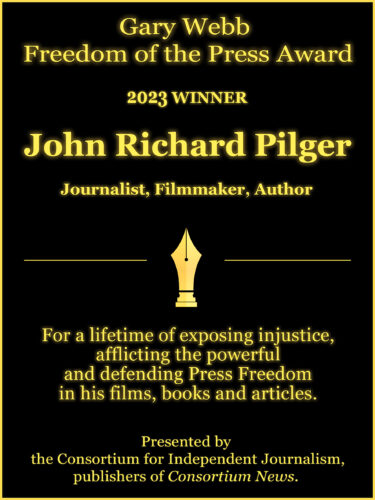 For his lifetime of extraordinary achievement Consortium News presented John with the Gary Webb Freedom of the Press Award. I was able to inform him of it just months before he died.
For his lifetime of extraordinary achievement Consortium News presented John with the Gary Webb Freedom of the Press Award. I was able to inform him of it just months before he died.
In presenting it to Jane Hill, a book editor and Pilger’s partner, on the stage of the British Film Institute on Oct. 28, I read the citation:
“Gary Webb, Freedom of the Press Award, 2023 winner John Richard Pilger, Journalist, Filmmaker, Author, For a lifetime of exposing injustice, afflicting the powerful and defending press freedom in his films, books and articles. Presented by the Consortium for Independent Journalism, publishers of Consortium News.”
Jane said:
“Thank you Joe. John’s son Sam, his granddaughter Matilda and I are really proud to receive this from you. It’s a great honor, and it’s something we’ll absolutely cherish. News that he had won this prize came, as you know, not long before his death. And at a time of very great personal struggle. So it was a dark time.
“And I can’t tell you how uplifting it was and how moved and proud he was to receive the news that he had won this prize. And it was both because it was in the name of Gary Webb, a journalist, a courageous journalist he really did admire, and also because it was coming from Consortium News. I think John said to me many a time that Consortium was one of the last outposts of independent journalism.
It was a place unafraid to publish information and viewpoints increasingly excluded from the mainstream. So thank you, Joe. And as John would say, all power to you.”
About the origin of the award, Robert Parry wrote: The award is named in honor of investigative reporter Gary Webb who in 1996 courageously revived interest in one of the darkest scandals of the 1980s, the Reagan administration’s tolerance of cocaine trafficking by the C.I.A.-organized Nicaraguan Contra rebels who were fighting to overthrow Nicaragua’s leftist Sandinista government.
The Contra-Cocaine scandal was originally exposed by Associated Press reporters Robert Parry and Brian Barger in 1985, but the major U.S. newspapers accepted the Reagan administration’s denials and treated the story as a “conspiracy theory.”
So, when Webb revived the story in 1996 for The San Jose Mercury News and described how some of the Contra cocaine fueled the spread of crack across urban America, the major newspapers again rallied to the defense of the Contras and the Reagan administration’s legacy.
The assault on Webb was led by The New York Times, The Washington Post and The Los Angeles Times – and was so ferocious that Webb’s editors at the Mercury News sacrificed him to protect their own careers. Webb found himself cast out from the profession that he loved.
It didn’t even matter that an internal C.I.A. investigation by Inspector General Frederick Hitz confirmed, in 1998, that the C.I.A. was aware of the Contra cocaine trafficking but had put its goal of ousting the Sandinistas ahead of any responsibility to expose the Contra criminality.
Because of the false impression that Webb had manufactured a fake story, he remained unemployable in mainstream journalism. In 2004, with his life in tatters and his financial resources spent, Webb took his own life, a tragic casualty in the difficult fight for a truly free press in America, a press that doesn’t just rubber stamp government propaganda and accept official lies as truth.
Watch the presentation of John Pilger’s Gary Webb Award:
Joe Lauria is editor-in-chief of Consortium News and a former U.N. correspondent for The Wall Street Journal, Boston Globe, and other newspapers, including The Montreal Gazette, the London Daily Mail and The Star of Johannesburg. He was an investigative reporter for the Sunday Times of London, a financial reporter for Bloomberg News and began his professional work as a 19-year old stringer for The New York Times. He is the author of two books, A Political Odyssey, with Sen. Mike Gravel, foreword by Daniel Ellsberg; and How I Lost By Hillary Clinton, foreword by Julian Assange.
Please Support CN’s
Winter Fund Drive!![]()
Make a tax-deductible donation securely by credit card or check by clicking the red button:



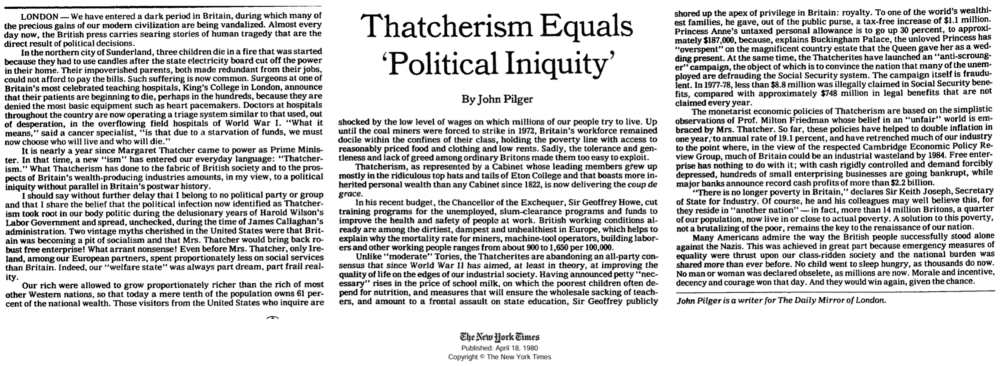
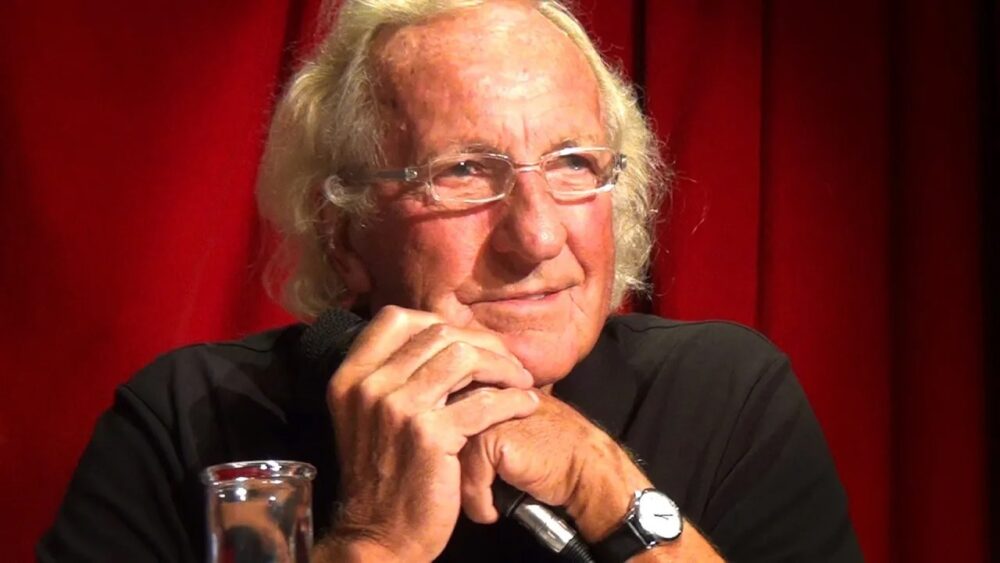
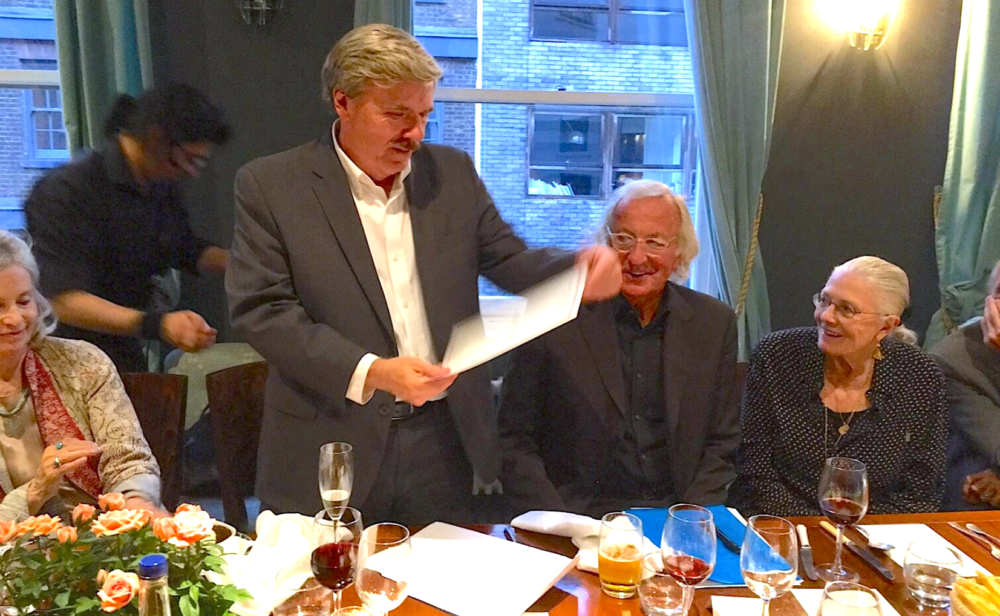
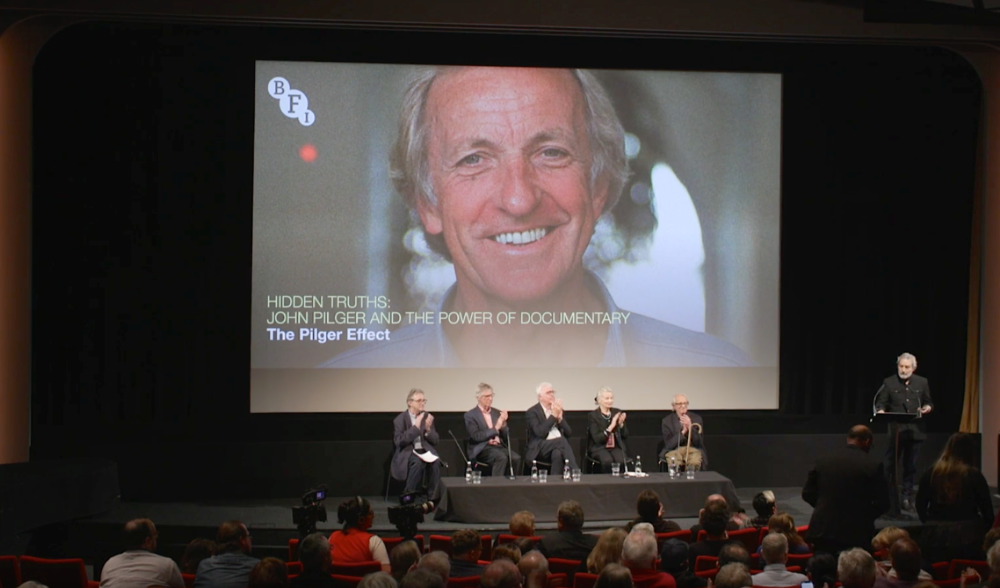

Without journalists like Pilger the corporate media would get its own way.
This is surely evident in the way MSM treated not only Julian, but nearly all those who throw a spanner in the works of the status quo.
Which, in Australia, was reflected in opinion poll results – even a recent as June 2024 – which showed less than 60% of Australians supported Julian.
Such a disgraceful result is a clear indication of the extent the influence/control that corporate media has over public opinion.
The poll result was a clear indication of how pervasive that ‘influence’ is.
Your mention of Julian as one worthy successor to John is certainly apt. Big boots to fill.
John himself was successor.
Wilfred Burchett, another Australian journalist, was someone whose work John much admired.
Burchett was the first ‘western’ to report from the war-crime that was Hiroshima; an event that motivated Burchett to report on US imperialism for the rest of his life, provoking successive Australian conservative governments to persecute him in ways similar to Julian.
I neglected to say R.I.P. John Pilger. Although I’d bet, presuming there is any afterlife, he won’t rest peacefully. If denizens of that afterlife are able to affect life in our present consensus reality, then wherever there is injustice his presence will be felt intensely.
Thank you, Mr Lauria, for this wonderful article.
Great piece. Great tribute.
Whenever I watch that Duanne Claridge interview, I have to remind myself that this is not a satirical comedy sketch but that Claridge was actually a real person. Good grief. Pilger will be/is much missed.
I knew a seasoned investigative reporter for a major west coast paper. He had a top level contact involved in the cocaine-Contra trade. With another veteran reporter from the eastern U.S., he met the informant in a wheat field miles from any prying eyes. That informant had Bush’s private phone number; something easy to dismiss as anecdotal or conspiratorial. But both reporters were known for meticulous research and both had broken huge political stories in their home towns. Their editors refused to run this very hot story, and they pretty much concurred since to do so would have meant threats to several people’s lives. Point is they knew Gary Webb was right. How many others also knew?
As for “their lie of being a benign influence in the world, of spreading democracy in the world rather than death and destruction…” Yes!!! This also includes domestic reality, like how Pilger describes the horrors of working class Sidney. Yet in Anglophonia, the educated elites refuse to see it. Many are anti-war when it’s far from home, but they ignore the Rust Belt and all the other former manufacturing communities devastated by the neoliberal assault on the majority working class. Worse, we’re blamed for our own destruction. The elite claims we’re politically ignorant, bigoted, or economically uninformed–none of which is true. Read Les Leopold’s //Wall Street’s War on Workers.//
On genteel liberal progressive sites I see comments to the effect that average voters need to “wake up and smell the coffee.” I tactlessly point out that’s merely a nicer version of calling us ‘a basket of deplorables.’ Not a great way to win us back to a party that was once ours. I have yet to hear any of the D faithful admit their party has been neolib for decades. And as of the last administration, neocon as well. Which also seems to be the case for western Europe.
Thank god John Pilger and Bob Parry live on in their works. Thank you for a wonderful article on this great man.
Duane Clarridge justifying and defending what the CIA was doing in the name of American national security is no different from any Soviet KGB agent justifying and defending what the KGB was doing in the name of Soviet state security. KGB is the abbreviation for the Russian name of the organization which translates into Committee for State Security.
The Soviets and the KGB were not the only bad guys during the Cold War.
The Weber saga breaks my heart. NYT, legacy media I know now are utterly captive to their uncaring readership–but I didn’t know it was as bad back then.. Add Snowden to Assange, Pilger, Weber–and now my only salvation, Consortium News. You will continue to get my continuing donations, and a 6-figure legacy if you persist and things play out for me as planned.
“Corporate media masterfully obscured the links between the decisions of the people’s elected and unelected leaders, and the human destruction that follows. ”
I’m not so sure that corporate media has masterfully obscured the links or is is just so stupid it doesn’t recognize the links. I’m inclined to think the latter as journalism has been dumbed down so much in the last 40 years that its hard to believe the remaining “reporters” can tie their own shoes, much less recognize links connecting dots anywhere. And as for the executives, graduates of know nothing business schools, what can you expect from them?
Sadly, capitalism has reached a point where those who are in control of the major industries, belong to a small club of people who are rather ignorant of the industries they control. They only know when profits are good or bad and when politicians are pleased or pissed. These, they can understand. Anything more complicated than that is way beyond them. Experts in the fields are leaving in droves out of frustration and setting up their own enterprises. This goes for journalism as well.
Unfortunately, the dumbing down of mainstream journalism has resulted in a dumbing down of the American electorate so we wind up with politicians like Trump to lead the charge (into oblivion).
Mate, what a man
That CIA interview just made my eyes fly wide open. “National Security Interests” is what they always claim, when they really should be saying “Corporate Interests and our politician and deep state interests in Corporate and AIPAC interest filling our banks accounts and bloating our campaign coffers.” Thank you for reminding us of this man and his work. Someday he will be a national and world hero, I hope. We died for the freedom of press, like the story of little known Elijah Parish Lovejoy, not taught in any journalism class I attended. I was taught that history after becoming a teacher at a school for the “at risk” (one must ask at risk of what, not adopting their parent’s morals?), children of wealthy elites, including the daughter of an editor of The Economist. Given an assignment on slavery, one student found Mr. Lovejoy, and educated me. I must say, I did love teaching the educationally privileged children of the elites. If education was as good for all the children of the world, what a grand world we would have. I do believe our educational system was built to keep the “lower” classes uneducated about the things and history that would really matter to them and would inspire their interest, intellects and actions.
Thank you for reminding us about one of the greatest investigative reporters the world has ever seen, a tireless champion for social justice.
Julian Assange is a worthy successor, both of them the greatest sons of Australia, yet reviled by many Australians (the knuckledragging type who lick the USA’s arse eg Scott Morrison, Pedo Dutton)